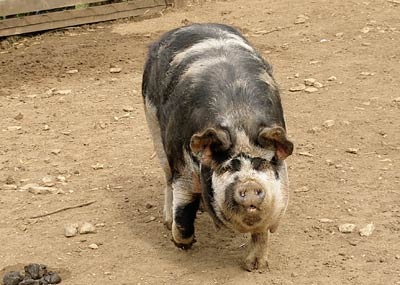
A pit dug in the ground in which a fire made of wood and topped with stones is lit. As the wood burns down, the superheated stones fall to the bottom to line the pit. Baskets lined with leaves or canvas are filled with meats and seafood and vegetables are lowered into the pit and set the white-hot stones, covered, then doused with water to produce steam. The food is buried in the pit and left to steam and roast under the mounded soil that is then shoveled atop the canvas or leave wrapped cages of food. The soil is left packed for at least three hours till the meats are tender and succulent. The Maori custom of cooking in this manner is saved for special occasions in New Zealand but is considered a national living tradition by all New Zealanders, in general.

It is thought that this rare breed was first taken to New Zealand in the 1800s by whalers, though it is not known where from. Similar pigs are found in parts of Asia, South America and the Polynesian Islands. Maoris kept Kune Kune pigs which were docile and didn't wander far from home. They are quick to learn tricks and love a good scratch of cuddle. This one, who has produced young, lives at the Cotswold Wildlife Park in Gloucestershire, and got a bit upset when it thought I was making too much fuss of her friend the donkey! They have only recently been rescued from extinction. Traditionally, the meat was fat and well-flavoured though I have not had the opportunity to try it.